WHO TAKES AWAY THE SINS…: WITNESSES TO CLERGY ABUSE
THE SURVIVORS
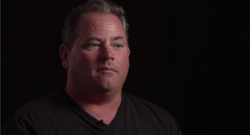 DAVID CARNEY
DAVID CARNEY
In that Chancery, I just couldn’t get out of there. It was like a dungeon. The doors were shut and I couldn’t get out of there. You know at that age, you’re scared. You know the monster’s upstairs. You’re running around the place trying to get out and you can’t get out. He finally comes in, flips the light and says: “I’ll drive you home.” It’s a scary thing and you have to walk into your parents’ house with a straight face. Inside you’re just dying.
*****
I didn’t trust anybody. Nobody. Nobody. Nothing…That’s the biggest thing right now: trust. I’ve never been married. I know it stems from that, but I’m blaming that on him. I just don’t trust. I’m learning to.
*****
They think: “teenager turned bad.” I did go to a high school that played hockey; I was the captain of the hockey team. I wasn’t going anywhere after high school, I was going to work construction. I knew that. The dream was wrapped up in a box and buried, it was gone.
*****
I could just sense that there was a better life. I don’t understand a lot of things, but I know enough and I do help people…. I have a nine year old boy and at the beginning when he’d go to school and come home, I’d check him. You know, that’s sad. That’s no trust in anybody. And ‘til this day I still tell him: “you know you have a little bubble around you, right, Brian? Nobody comes in that bubble. He gets in that bubble, you push away and you come tell daddy.”
*****
I will tell him, I will tell him exactly, if he wants to know everything I’ll sit him down and I’ll tell him. I don’t want him not to trust the world because Daddy didn’t trust the world, I don’t want that. No, I don’t. I want him to be able to trust and not worry like me.
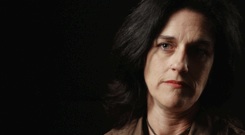 KRISTIN MERRILL
KRISTIN MERRILL
I think I was 15 when it stopped. I used to work at the rectory Wednesdays and Sundays, and then I had gotten a job. I think it was about that time that it had stopped. ….No one’s going to believe me. He’s a priest, he’s next to God. I’ll go to hell. I have sinned. I still feel guilty about it.
*****
I think the church likes sweeping things under the rug. I’ve done my own healing; it has taken me a long time. My dad says that if it takes you 30 years to walk into the woods, it’s going to take you 30 years to get out. It’s an ongoing process.
*****
There should be accountability for them. There should be – the laws need to be changed. It doesn’t matter if it happened two days ago, two weeks ago, twenty years ago, thirty years ago, they should still be held accountable because there is still hurt and there’s still pain.
*****
The laws protect the perpetrator, the law, as well as the Catholic Church. The Catholic Church still protects the priests and the brothers and… they don’t protect those poor children. I just think that needs to be changed, and money, money doesn’t help.
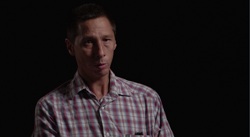 GERALD SYPEK
GERALD SYPEK
Once you come forward and start working with others, the people around you help to build your self-esteem. It’s a brutal thing when you go through life absolutely hating yourself.
*****
I said, “Mom, Dad, there’s something you really have to know about this. You took me out of a Catholic orphanage, and I’ve got to tell you there’re things you don’t know about that were going on there and it has affected me my entire life. I’ve lived with it.”
*****
I am right now 50 years old. I have never been married, I never had kids. My ability to form those types of relationships is gone because I don’t trust people. I have a tendency to build huge walls around myself…. that’s why I don’t have long-term relationships. I just don’t like being close to people.
*****
I still will not go to a Catholic Church, I still want to throw rocks through the windows because it seems to me quite honestly, their priority was in appearances, and those windows are perfect. They’ve spent so much time, money and energy on those windows. Take that same time, money and energy and focus it towards the kids, towards what’s going on, from the top of your church down. But no, our appearances are more important. It seems that the church has actually put the institution of the church ahead of the children, which are their primary focus.
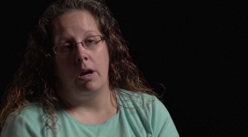 ALEXA MACPHERSON
ALEXA MACPHERSON
The past is never the past because it’s your past, your present and your future. It becomes you, it defines who you are, how you got to the point that you are and you know, your environment shapes you but it doesn’t fully define you. It is how you as an individual deal what has happened to you.
*****
And so a predator is going to go after whomever he or she has access to. They may have a preference for one or the other but given no other alternative they’ll go after anything that’s there and they show no preference at that point any longer. They just see what they want, they just see their reward, they want their desires filled and I was a very accessible treat for this priest because of my age and I had no recourse. I couldn’t run away. I was too little and the large majority of my abuse happened in the family home, in the kitchen, in the living room, in the playroom, in the pool, right under my parents’ nose with my dad sitting feet away watching TV in the living room and my mother sometimes literally 10 feet away from me, hanging laundry out the back window with the priest sitting in the kitchen next to me.
*****
You know what the church told my parents to do? Keep it quiet. Shut up. Go away.
*****
He was that wolf in sheep’s clothing that the Bible talks about, you know, he’s the snake that slithers around. He’s an animal, that’s all there is to it, and I have to now give my girls the skills to make sure this never happens to them and that they don’t ever have to suffer what I suffered, and what I still suffer. I can live for myself and deal with the pain, I could just never live knowing something happened to them and I can’t image the pain that my mother and my father feel, and the guilt my mother carries around with her.
*****
Now I have two small kids, two small little girls that I have to watch for and make sure something like this never, ever happens to them and give them the skills and the mindset that I never got, the understanding that no matter what somebody says to you, you are always safe to come to your mummy or your daddy.
*****
It’s never forgotten by the people like me who are the survivors of this tragedy. I don’t hide it, I don’t sit there with a sign on my head or over my desk that says “Hey, you know, clergy abuse survivor here”. There will probably be some people that would be surprised to know my background and wonder how I’ve ever functioned as well as I do.
*****
There are things I will carry with me ‘til the very end, issues I’ll never, ever get over. I find ways to deal with them. I give back, I inform people. Ignorance is bliss to some people, but knowledge is what’s power. And being out there, being at the forefront and speaking out and letting people put a face to a name, brings it home.
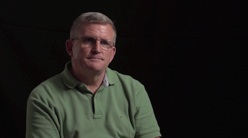 ROBERT HOATSON
ROBERT HOATSON
I was a junior, going into senior year and an Irish Christian Brother said to me that he was going to put me in his senior year English honors class because I was so smart. I politely said “no thank you, I’m doing great where I am and I’d like to be in the class that I’m assigned to.” Well, he had me transferred into his class anyway. What I didn’t realize at the time though, in 1969, was that my cousin, who was three years older than I was, had already been abused by this Irish Christian Brother’s best friend, also an Irish Christian Brother.
*****
Well, I decided that I wanted to join the Irish Christian Brothers.
*****
That’s where the betrayal began then and it just kept going, and going. I was betrayed once. I was betrayed twice. I was betrayed a third time, a fourth time, a fifth time. It’s not easy to get over. Yes, Father, Yes, Father, Yes, Father, I will pay, pray and obey.
*****
We’ve given the clerical culture that foundation. Now we have to destroy it, and it’s being destroyed very gradually. But my goodness, the mentality of somebody who could abuse a child is unfathomable to those who really know the worth of a child. Society has not always treated children as human beings. Even in state constitutions, children have been referred to as property, so society has a little bit of a responsibility for this too.
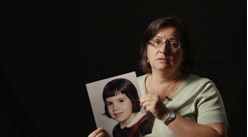 HELEN MCGONIGLE
HELEN MCGONIGLE
I’m one of many victims. I was only 6 when Father Brendan Smith, a Norbertine priest, started to abuse me. And he came from Ireland and was assigned to my parish in East Greenwich, Rhode Island. And Smith was a serial pedophile, one would call a fixated pedophile, he abused both girls and boys. It wasn’t just the altar boys; it was the girls as well. The abuse started at age 6 and it lasted until approximately age 9, so from first grade through third to fourth grade was the time frame.
*****
Any organization, whether the Catholic Church or a cult, whatever it is, that operates with this degree of secrecy, it’s a recipe for disaster and that’s the track they’re on. And unfortunately what has happened is instead of being open, honest, transparent, saying these are the documents, this is what happened, we knew what was going on, we didn’t really understand the impact necessarily, we want to address it now. If they came clean when this exploded in the news in Boston in 2002, they wouldn’t be where they are today, which is they’re falling backwards. They could’ve been transparent, healed and moved forward. So that’s the church.
*****
We see all sorts of violence or trauma on the news, and we walk away from the picture tube and try not to think about it. We try to suppress it; we try to repress it because just as if you were a Holocaust survivor, if you thought about those experiences day in and day out, you wouldn’t be able to function. But we need the people who have not had those experiences, people that are the bystanders to be willing to stand up and say “You know, I know about this. I want to educate myself more on it, and I want to take a stand and I want to do the right thing”. And that’s what it takes. It takes the public education.
*****
We all have a Creator and we all got here somehow, and we have to learn to live on this planet together, and if the Church wants to be part of that, they have to stop their own violence because they are creating violence. They’re not solving the problem and transparency is essential. If they don’t do that, they’re only going to create more violence and harm.
*****
We’re the real church, not the priests. So my hope is that if we can get more people who are in the bystander role to realize that this is the way to healing for the church, if it wants to stay in this world and not create violence. We also have to welcome other faiths in spirituality. And we also have to recognize that women play a very important role in this whole process.
*****
Someone like Brendan Smith, he was a soul, we’re all souls…but those who have protected him, those who have let the tiger out of the cage over and over and over again to rape children, I can’t forgive them right now. What I can’t forgive is an institution, protecting his crimes and protecting the church at the expense of children.
THE INVESTIGATIVE REPORTER
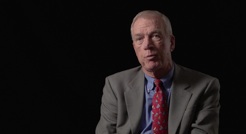 WALTER ROBINSON
WALTER ROBINSON
In all of those cases, it had been my memory, and we certainly went back and researched this, the church, or the Bishop or the Archbishop or the Cardinal in the Diocese or the Archdiocese where this happened, had always said “Trust us, this is one aberrant priest and we’ve taken care of it”. We all trusted the church. We all grew up in it.
*****
This team produced 800 stories in the calendar year 2002 about this scandal. At the end of the year the Cardinal was relieved of duty and returned to Rome.
*****
It is a fact that sexual abuse of children in our society is more widespread and remains more widespread than anybody, most anybody’s willing to acknowledge. What distinguishes the Church in this is not so much that some percentage of priests did this but that the institution betrayed the people who looked to it for all sorts of spiritual and moral leadership. That it was the institution and the leaders… to imagine that so many people in authority knew about this and allowed it for decades to go on…
*****
You know when I was first told that, Geoghan aside, there were some other large number of priests, and there wasn’t a number put on it at that point, I remember going home to my wife and saying “What if there were 10 or 15 priests involved in this? That’s horrid if something like that happened.” As we came to learn, it was some large multiple of that. You say to yourself, how could this have been possible, that this was kept quiet for so long? We’re talking about the most iconic institution in our society, certainly in Massachusetts. And so it was unimaginable to me, to others, to the reporters that worked on the story for the first six months – we were all raised Catholic. We were stunned. We were constantly astonished at what we found.
*****
Over a span of months, the records of literally over a hundred priests became public. We published a lot of the details, although a lot of times we tried to keep the most sordid details to a minimum because our focus from day one was as much on the cover up and how those in charge facilitated this as it was on the priests who actually molested the children.
*****
I have to tell you, I’m a tough guy, and when I say I’m a tough guy I’ve done a lot of tough stories over time. I’ve covered a war, fought in one. These were, far and away, the most difficult stories for reporters to handle emotionally and there were more than a few nights when I cried in my car driving home because of what I had been told by the victims.
CONCERNED CLERGY
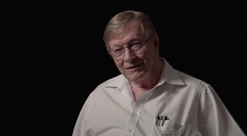 REV. RAYMOND G. HELMICK, SJ
REV. RAYMOND G. HELMICK, SJ
The bystanders are always important in any situation like this. Most of the Holy Church didn’t know about it. There was tremendous deference to clergy and I can remember being told by my mother when I was growing up: never criticize a priest. That’s pretty cushy if you are one! That’s not true anymore, of course. For people to actually report something like that: who saw it, the general Catholic public had no idea about it. It was victims who knew about it. They were very carefully shepherded along to make their declaration of silence.
*****
If you are a Bishop, for that matter, if you are a Pastor, or certainly if you’re a Cardinal or if you’re management in a corporate curia, then you feel you have two different responsibilities. You have a responsibility to your membership and you have a responsibility to the institution.
*****
As I see it, the church, the Catholic Church, is in crisis. It was in crisis before all of this came out publicly. We know it was going on and the whole power question in the church had actually been addressed very powerfully by the Second Vatican Council.
*****
The fact is that the Council had come up with many good things, but the substance of the Council was in two things: collegiality and the recognition that the church includes everybody. People of God was the formula. The Curia types were so frightened by that, that they have worked very hard ever since to simply cut those off at the bottom. Pope John XXIII ran a Council in which the watchword was not ‘control’ as it had always been, but instead it was a consultation of the church.
*****
The guy at the top holds others accountable. Nobody holds the administrators accountable; it’s always the people at the bottom.
*****
As we grew up as Catholics, the deference to the clergy was built into the system. The priest had to be right, the priest had to be deferred to, there had to be submission. It really worked out that the primary good in the church was control. Now that isn’t what Jesus was talking about.
*****
The culture of deference has its own sinister side. I am very conscious of the damage to a church, to an association, to which I attach this tremendous value and that damage is parallel to the damage that’s done to individual persons. It can never become a substitute for it; it can never become a reason to ignore the damage really being done to persons.
*****
This culture of silence was maintained for the preservation of the institution, the Holy Church. The people of God, all of these people who are related in communion to Christ, are more important than the institution.
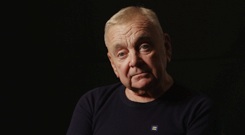 REV. WALTER CUENIN
REV. WALTER CUENIN
There was a whole group of priests. We formed a group called the Priests’ Forum, and as this thing began to unfold we said to ourselves we have to speak. The lay people demand that the priests speak. But we were nervous, so we said if we get 50 priests to sign on, we’ll go with it. We got 58, and there were many more who would have come later that weekend but we had to go with it. We just felt, as a group of clergy, we had to ask the Cardinal to leave.
*****
Also, you have to be engaged with people. You have to consult them. I remember one time when I was a pastor in another church, and we were doing over the church, a renovation, which is always controversial. Two people came to see myself and the pastor and they said they were opposed to it: “we are very traditional Catholics, we don’t like this.” The pastor was a very wise man and said: “Well, I appreciate your coming, but you’re not a traditional Catholic, because a traditional Catholic would have come and said ‘Father, how much do I give?’ They would never have questioned the wisdom of a pastor.”
THE ATTORNEY
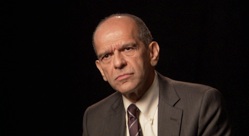 ATTORNEY MITCHELL GARABEDIAN
ATTORNEY MITCHELL GARABEDIAN
I spoke to the children and I discovered that this priest, Father John Geoghan, whom I’ve had 143 claims against since 1995, was sexually molesting these children when he was putting them to bed. He’d say: “I’ll pray on top of you,” as they were lying down. He wasn’t really praying in a religious sense, but he was preying upon them by sexually molesting them when he was supposedly praying. It turned the children’s emotional state inside out…. The priests would threaten a child and say “You have to keep this matter secret. If you don’t keep this matter secret, your mother will burn in hell, or you will burn in hell or terrible things will happen to you.” Of course, a child believes that.
*****
I filed 86 lawsuits. I filed a handful of lawsuits and we went to court one day and the judge said “do you have any more lawsuits you’re going to file?” and I said to him “Sixty” and he said “Oh, sixteen!” I said no, sixty. And there was dead silence in the courtroom. We had the richest institution in the world, the Catholic Church, telling me I couldn’t do anything about this, and I had mothers, whose children needed psychiatric care immediately, and we had a church that didn’t care about the victims. They only cared about keeping it quiet because of their power and influence. They wanted to maintain their power and influence.
*****
What I’m working on is changing the law. The law has to be changed so the statute of limitations is more favorable to victims, both criminally and civilly, because it’s all about accountability. We have to hold the institution accountable and we do that through our actions, advocates working behind the scenes, publicly through the media, and through the law. We have to hold the churches accountable. They believe that they’re almighty, and no one can touch them, but we have to keep fighting them.
THE ADVOCATES
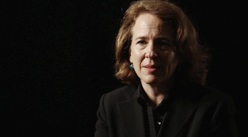 ANN BARRETT DOYLE
ANN BARRETT DOYLE
I think if church officials want to actually contribute to reconciliation, what they could do for starters, is every Bishop in the United States could put a list on his website of the accused clerics in his diocese. That would save lives. In every Diocese in the United States there is still a cover-up. The reason the church doesn’t do that is that inevitably more victims come forward when that happens. And they’re looking at their pocketbooks. They don’t want to encourage more victims to come forward. They don’t want it to lead to more exposure of their own crimes of enablement, because they continue to be self-protective that this crisis isn’t over yet.
*****
Before 2002, virtually no church officials reported allegations of child sexual abuse. I think what’s striking is the complete lack of horror by church officials at the idea of a child being raped, you know? If you or I hear about it, we would throw ourselves in front of a truck to stop a child from being hurt that way. Our sense of horror is so visceral and so much part of our conscience, that we couldn’t live with ourselves if we didn’t do something to protect that child.
*****
Something has happened to leaders in the church where this absolutely normal reaction has been effaced and replaced with a deep justification, you know. They, they really feel entitled to do anything to protect the reputation of the church and to protect their own reputations.
*****
It has made me profoundly disillusioned with the leadership of my church – I’ve never been any kind of activist in the church before but I really do think, on a purely personal level, that God’s behind this and that the Catholic Church is going to come out in a purer form than it ever has been: that’s the faith that keeps me going.
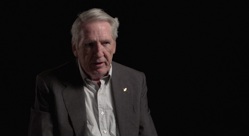 PAUL KELLEN
PAUL KELLEN
So you know that on so many levels they carry this burden and I can’t even predict what effect it has on their decisions and their life but it never, ever goes away. “I must’ve done something, I was a participant, God doesn’t like me”, whatever, I don’t know what it is…
*****
There’s no question…the word is suffering. The showing up every Sunday…we’re trained that way. So I just shifted focus, from the sanctuary to the sidewalk and on the sidewalk I find people struggling with that moral commitment. They’re there in very large numbers and there’s a relatively simple message. Sometimes you meet somebody and it’s a very short interaction: you meet them and you talk to them and you find out what had happened to them.
*****
There were some pictures around at that time and we started to put them on foam core and there were a lot of people in those days, a lot of pictures. I decided that somebody had to be responsible, to pay attention to the logistics of the pictures, so I started collecting the pictures. Another thing that I do when I meet survivors: I tell them, if they have a picture, I will take it. I will put it on a board and I will put their face in front of the world. And we put their first name and the age of abuse, because people need to know how old they were.
